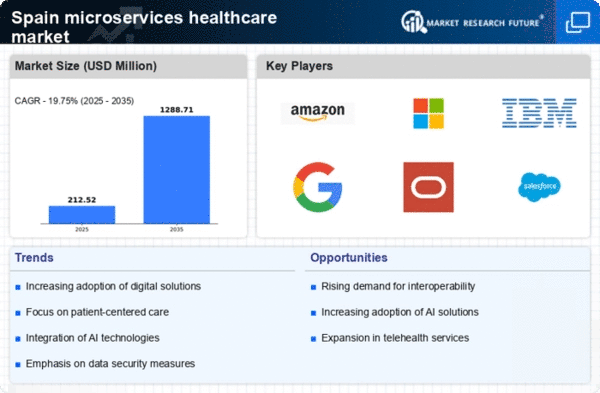Focus on Cost Efficiency
Cost efficiency remains a critical driver for the microservices healthcare market in Spain. Healthcare organizations are increasingly seeking ways to reduce operational costs while maintaining high-quality care. Microservices architectures offer a modular approach that allows for the optimization of resources and the reduction of redundancies. By adopting microservices, healthcare providers can achieve significant savings, with estimates suggesting that operational costs can be reduced by up to 25% over time. This focus on cost efficiency is likely to propel the adoption of microservices solutions across the healthcare sector in Spain.
Rising Demand for Customization
The microservices healthcare market in Spain is experiencing a notable rise in demand for customized healthcare solutions. This trend is driven by the need for personalized patient care, which is increasingly recognized as essential for improving health outcomes. Healthcare providers are seeking to implement microservices architectures that allow for tailored applications and services, enabling them to meet specific patient needs more effectively. According to recent data, approximately 65% of healthcare organizations in Spain are prioritizing customization in their digital transformation strategies. This shift towards personalized care is likely to enhance patient satisfaction and engagement, thereby driving growth in the microservices healthcare market.
Growing Emphasis on Data Security
As the microservices healthcare market in Spain expands, the emphasis on data security is becoming increasingly pronounced. With the rise of digital health solutions, concerns regarding patient data privacy and security have escalated. Healthcare organizations are prioritizing the implementation of robust security measures within their microservices architectures to protect sensitive information. Recent surveys indicate that approximately 80% of healthcare providers in Spain consider data security a top priority in their digital transformation efforts. This growing emphasis on safeguarding patient data is likely to drive further investment in microservices solutions that incorporate advanced security features.
Integration of Advanced Technologies
The integration of advanced technologies such as artificial intelligence (AI) and machine learning (ML) is significantly influencing the microservices healthcare market in Spain. These technologies enable healthcare providers to analyze vast amounts of data, leading to improved decision-making and operational efficiency. The adoption of AI and ML within microservices frameworks allows for the development of innovative applications that can enhance patient care and streamline processes. Recent studies suggest that the market for AI in healthcare in Spain is projected to grow by over 30% annually, further underscoring the potential for microservices to transform healthcare delivery.
Regulatory Support for Digital Health
In Spain, regulatory frameworks are evolving to support the adoption of digital health technologies, which is a significant driver for the microservices healthcare market. The Spanish government has introduced various initiatives aimed at promoting digital health solutions, including funding programs and incentives for healthcare providers. These regulations are designed to facilitate the integration of microservices into existing healthcare systems, thereby improving efficiency and patient care. As of November 2025, it is estimated that around 70% of healthcare institutions in Spain are aligning their strategies with these regulatory guidelines, indicating a strong commitment to embracing microservices architectures.
















